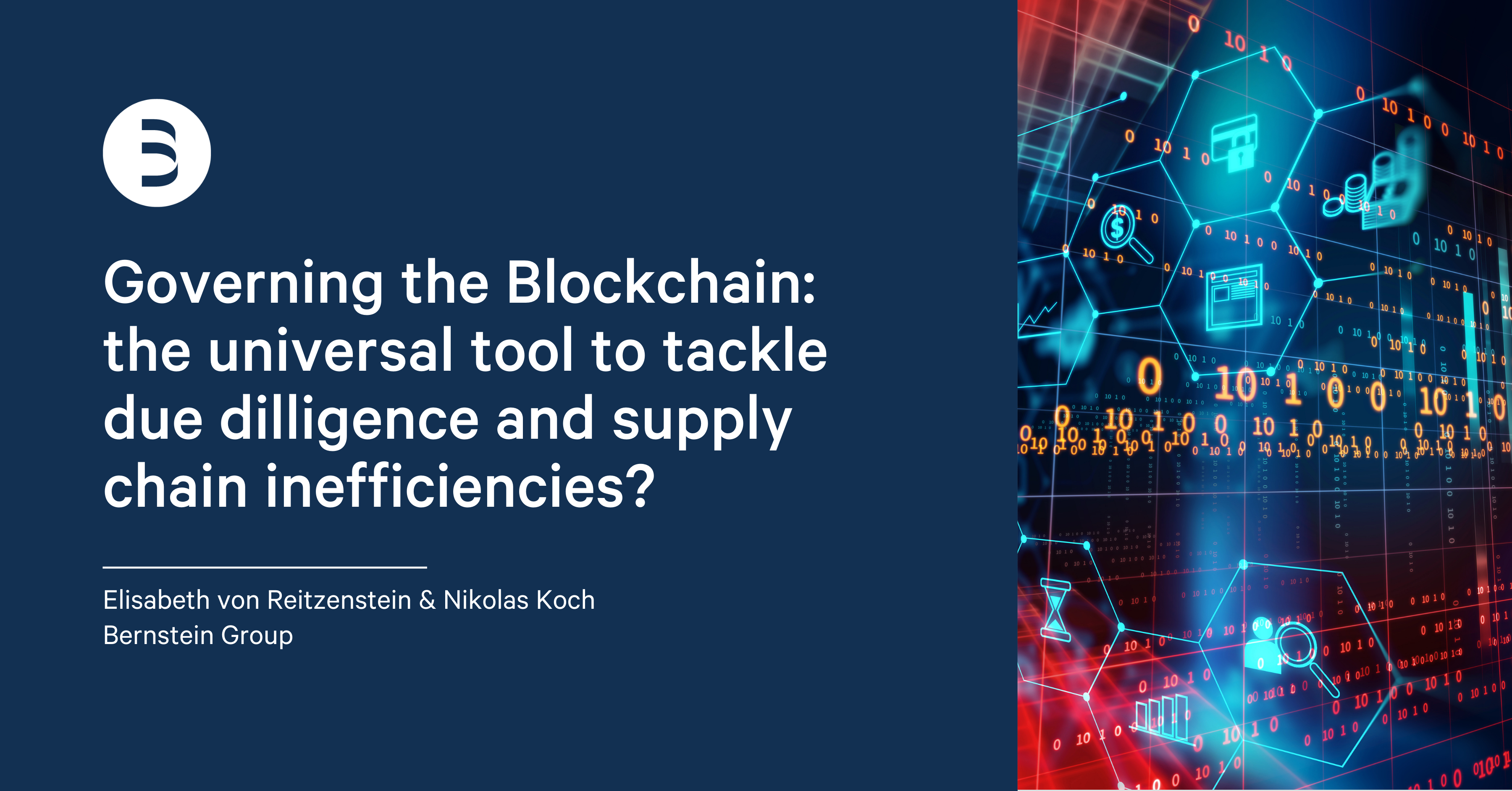
Increasingly, digital technologies are capturing the attention of start-ups, citizens, and companies, and technological innovations are providing fascinating opportunities for businesses. However, they are also attracting the attention of legislators and regulators, who are eager to proactively encourage and shape innovation. Of these technologies, few are drawing more interest than blockchain, the digital record-keeping technology behind Bitcoin and other cryptocurrencies.
Blockchain is prized for its ability to publicly validate, record, and distribute transactions in immutable, encrypted ledgers. Each transaction is verified by the consensus of a majority of participants in the system, creating a decentralised record which is detailed, transparent, time-stamped, and tamper-resistant. Blockchains can be public, controlled by a consortium of entities, or privately run by a centralised authority.
Proponents hope that the technology can innovate information exchange in an increasingly connected world. As the EU’s Blockchain Strategy states, the technology “will be instrumental in building a citizen-centric, sustainable, transparent and inclusive European digital society”. One such example is supply chains and product safety, where blockchain promises efficiency gains as well as an opportunity to incorporate environmental, social and governance issues and improve consumer safety in business.
A Path to Sustainability
Historically, blockchain has primarily been used in the Fintech industry, promising efficiency gains, increased transparency, and the potential for automated “smart contracts”. However, the technology’s use-cases are growing rapidly, with relevance in almost every area of activity where the integrity, consistency, and security of data is important. For example, blockchain could also be a significant tool in encouraging sustainable business. Given that blockchain allows for full product traceability along the entire supply chain, it would enable stakeholders to access information regarding environmental, social, and governance standards. Blockchain could map each products path, from its creation to the consumer, and in a circular economy across the whole lifecycle, in a forgery-proof manner. Both companies and consumers would benefit from improved visibility over outsourced manufacturing, which would enable an achievable means of encouraging sustainable business in a complex, globalised world.
Therefore, it is not surprising that significant interest has been shown in blockchain’s sustainability potential at both European and national level. For example, the “European Blockchain Strategy” of January 2021 specifically recognises the potential of blockchain in “fostering sustainable economic development, addressing climate change and supporting the European Green New Deal”. Furthermore, in a Resolution on Corporate Due Diligence and Accountability from March 2021, the European Parliament also highlighted the contribution which innovative technologies like blockchain could make in enabling undertakings to track their due diligence obligations in the entire value chain.
The potential of blockchain in supply chains is also being pursued by legislators at national level. Already in 2019, Germany has adopted its own “Blockchain Strategy”, which notes that:
“The Federal Government aims to advance the possibilities that blockchain technology provides for supply chains and value chains, […] The Federal Government is examining whether blockchain technology can be used and promoted, firstly, to secure supply chains that are environmentally and socially sustainable, efficient and secure, and secondly, to contribute to the closing of product life cycles.”
More concretely, the German government is trialling blockchain usage in three pilot projects operated by the Bundesministerium für wirtschaftliche Zusammenarbeit und Entwicklung (BMZ). Covering supply chains for agricultural products in Ethiopia, a traceability system for a coffee cooperative in Rwanda, and a spice supply chain in Sri Lanka, it is hoped that blockchain technology can provide an effective tool to monitor commitments to environmental, social and governance goals.
Blockchain in product safety
The use of blockchain in supply chains also shows significant promise in improving safety for both products and goods. In the last year, the European Parliament has considered several applications concerning how blockchain could improve consumer product safety.
The European Parliament’s Report on product safety in the single market from November 2020 considered several advantages which blockchain could provide for this field. Primarily, blockchain could be used to improve customer’s knowledge of the respective product, for instance, by developing “interoperable databases on injuries caused by unsafe products circulating in the single market.” Like concerning blockchain’s sustainability applications, the technology could be used as an important tool to inform consumers. Moreover, blockchain could improve the effectiveness of authorities and distributors in taking early action against unsafe products. Given that counterfeits are often linked to higher health and safety incidents for consumers, blockchain could be used to better mitigate risk and improve safety compliance. In this context, an improved knowledge of individual supply chains could enable simpler and more effective supervisory surveillance checks. Blockchain can therefore provide an exciting prospect for businesses, promising innovative data-sharing possibilities, as well as a means to encourage both sustainability and better product safety.
The Political Picture
For stakeholders interested in developing the regulatory framework of blockchain, the current legislative climate is encouraging, particularly in the context of sustainable business. While Germany recently passed a law for due diligence in supply chains, European Commissioner for Justice Didier Reynders has committed to a legislative initiative on sustainable corporate governance which is expected towards the end of October 2021. In the discussions surrounding both proposals, legislators expressed a clear interest in encouraging the effective use of technology, including blockchain, to monitor environmental, social, and governance commitments.
From a product safety perspective, the General Product Safety Regulation, which was proposed by the European Commission at the end of June to review the existing Directive, also provides interesting possibilities regarding the inclusion of blockchain technology to ensure product safety. Legislators are clearly excited about the potential of blockchain, and keen to hear from businesses experience on how to effectively implement the technology. Moreover, given the scale of funding available to European businesses, now is the time for stakeholders to involve themselves and shape the discussion of how blockchain technology will be used to improve our everyday lives.